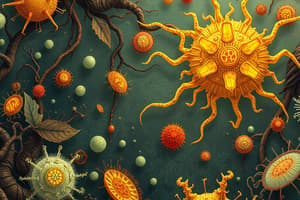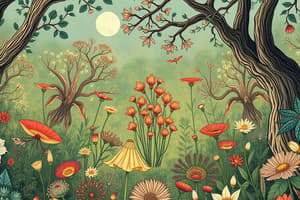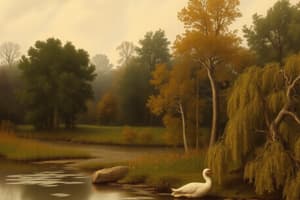Podcast
Questions and Answers
What are biomes?
What are biomes?
- A type of nutrient cycling
- Specific types of ecosystems (correct)
- The smallest unit of an ecosystem
- A measure of trophic efficiency
What are the key concepts in ecosystem ecology?
What are the key concepts in ecosystem ecology?
- Climate change and ocean acidification
- Biomes and their interactions with the environment
- Energy flows and nutrient cycling (correct)
- Trophic efficiency and decomposers
What is ecology?
What is ecology?
- The study of interactions between species and their prey
- The study of interactions between species only
- The study of interactions between species and their predators
- The study of interactions between species and their environment (correct)
What are the key concepts in ecosystem ecology?
What are the key concepts in ecosystem ecology?
What is the role of decomposers in ecosystems?
What is the role of decomposers in ecosystems?
What is the role of decomposers in ecosystems?
What is the role of decomposers in ecosystems?
What is trophic efficiency and how is it measured?
What is trophic efficiency and how is it measured?
What is an ecological community?
What is an ecological community?
What is the definition of trophic efficiency?
What is the definition of trophic efficiency?
What is trophic efficiency?
What is trophic efficiency?
What are the two types of interactions in ecological communities?
What are the two types of interactions in ecological communities?
How do decomposers contribute to nutrient cycling?
How do decomposers contribute to nutrient cycling?
How do carnivores at the top trophic levels impact ecosystems?
How do carnivores at the top trophic levels impact ecosystems?
What are biomes and how do they relate to ecosystems?
What are biomes and how do they relate to ecosystems?
What are the major negative interactions in ecological communities?
What are the major negative interactions in ecological communities?
What is the main cause of eutrophication in receiving waters?
What is the main cause of eutrophication in receiving waters?
How do human activities impact the nitrogen cycle?
How do human activities impact the nitrogen cycle?
What is the difference between biodegradable and non-biodegradable pollution?
What is the difference between biodegradable and non-biodegradable pollution?
How do biodegradable vs non-biodegradable pollutants affect nutrient cycling?
How do biodegradable vs non-biodegradable pollutants affect nutrient cycling?
What are the effects of predation on populations?
What are the effects of predation on populations?
What is eutrophication?
What is eutrophication?
What is the main cause of human alteration of the nitrogen cycle?
What is the main cause of human alteration of the nitrogen cycle?
What is parasitism?
What is parasitism?
What is the difference between biodegradable and non-biodegradable pollution?
What is the difference between biodegradable and non-biodegradable pollution?
What is the main way in which hippos alter ecosystems?
What is the main way in which hippos alter ecosystems?
What is competition?
What is competition?
How do carnivores at the top trophic levels impact ecosystems?
How do carnivores at the top trophic levels impact ecosystems?
How do chemicals build up in organisms' tissues?
How do chemicals build up in organisms' tissues?
What is the main difference between ecosystems and biomes?
What is the main difference between ecosystems and biomes?
What is the ecological niche?
What is the ecological niche?
How do hippos alter ecosystems?
How do hippos alter ecosystems?
How do ecosystems vary in size and how can they be defined?
How do ecosystems vary in size and how can they be defined?
Flashcards are hidden until you start studying
Study Notes
- Ecology is the study of interactions between species and their environment
- An ecological community is an assemblage of populations of different species living close enough in an environment for potential interactions
- Interactions can be intraspecific (within a species) or interspecific (between several species) and can be neutral, positive or negative
- Predation and competition are major negative interactions in communities
- Predation has effects and implications on population size, behavior, physiology, and evolution
- Parasitism is a negative effect on one species to the benefit of another, but does not result in death
- Competition results in negative effects on both species and can lead to resource partitioning or character displacement
- Competition affects species richness, niches, and traits
- The ecological niche is all the environmental conditions and resources that allow the persistence and growth of the species.
- Interactions can evolve to neutralism thanks to resources partitioning or character displacement
Studying That Suits You
Use AI to generate personalized quizzes and flashcards to suit your learning preferences.




